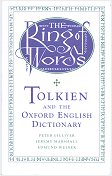There's a joke about someone reading a dictionary, and complaining that the plot is a bit disjointed, with characters introduced early on who disappear, never to be seen again. This book, by three editors on the Oxford English Dictionary, shares some of that style. It's about Tolkien, language and the OED. It assumes the reader knows quite a lot about Tolkien, language and the OED already.
The first part, Tolkien as Lexicographer, is about Tolkien's time working at the OED, and some of the words he worked on, mostly ones beginning with W, defining their etymology and meaning.
The words he worked on include waggle, wain, waistcoat, waiting, wake, wallop, walnut, walrus, wan, wander, wane, want, warlock, weald, wield, wild, wold, and more. The authors have access to the original slips on which the words were defined, some reproduced here, and they discuss the differences between those, and the edited versions that eventually appeared in print. Along the way, we learn fascinating tidbits about the words themselves: walnut means 'foreign-nut', the wal- prefix being the same as in Wales, but the foreigners at the time of nut-naming were Romans; the etymology of walrus was particularly troublesome; wan used to mean 'dark, gloomy, black'; and so on.
The second part, Tolkien as Wordwright, covers philology, the invention of new words, the use of archaic words by various authors, and, most interestingly, Tolkien's use of philological rules to transform lost archaic words into what they would be today had they survived. (The out-of-order dictionary-like aspect is highlighted here, in that the first section of this part is titled "What is Philology?", despite this term having been used without definition throughout Part I.)
The final, and largest, part of the book, Word Studies, is an alphabetical coverage of individual words used in Tolkien's writings, that have entered the OED, and descriptions of their origins: either as archaic words, as existing but not well-known words, or as invented words. These entries also describe various scholarly puns and word games that Tolkien played (although I'm not sure that it's that clever a scholarly cross-language pun if you invented one of the languages yourself).
So, plenty of interesting factlets, but it is a bit like reading a dictionary in places.
